U.S. House passes stopgap spending bill in bipartisan vote, in crucial test for new speaker
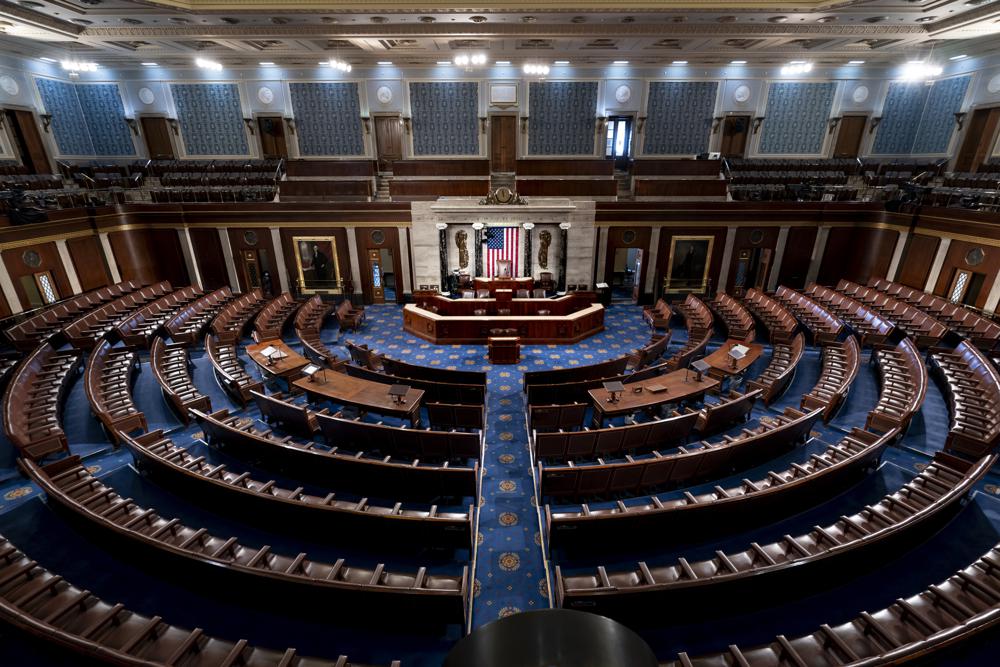
Jennifer Shutt, Alabama Reflector WASHINGTON — The U.S. House took a broadly bipartisan vote Tuesday to fund the government into the new year, though the measure must pass the Senate by the end of the week if Congress is going to avoid a partial government shutdown. The 336-95 House vote was the first major legislative test for Speaker Mike Johnson, the Louisiana Republican who took on the role after the former speaker was ousted after passing a similar bipartisan short-term funding bill in late September. A total of 93 House Republicans voted against the bill, but enough Democrats supported it to send the measure to the Senate. In the Alabama delegation, U.S. Reps. Robert Aderholt, R-Haleyville; Terri Sewell, D-Birmingham, and Dale Strong, R-Madison, voted for the bill. U.S. Reps. Jerry Carl, R-Mobile; Barry Moore, R-Enterprise; Gary Palmer, R-Hoover and Mike Rogers, R-Saks, voted against it. Senate Majority Leader Chuck Schumer, a New York Democrat, said Tuesday that he and Minority Leader Mitch McConnell, a Kentucky Republican, both agree the Senate needs to pass the bill quickly to avoid a funding lapse. “If the House should pass it, and I hope they do, Leader McConnell and I will figure out the best way to get this done quickly,” Schumer said. During a press conference prior to the vote, Johnson defended his decision to move the short-term spending bill, saying it would prevent Congress from passing an omnibus spending package in mid-December before the holiday break. Republicans have repeatedly said they oppose such massive packages, which wrap together all 12 government spending bills, often on short notice. He rejected criticism from fellow GOP lawmakers that he was making a mistake and taking the wrong approach to funding the government. “We’re not surrendering, we’re fighting. But you have to be wise about choosing the fights,” Johnson said. “You’ve got to fight fights that you can win, and we’re going to, and you’re going to see this House majority stand together on our principles.” Johnson said he was optimistic that Congress would be able to pass the dozen full-year appropriations bills before the new deadlines next year, avoiding the need for another stopgap spending bill. “Part of the reason I’m confident about this is, I’ve been drinking from Niagara Falls for the last three weeks. This will allow everybody to go home for a couple of days for Thanksgiving,” Johnson said. “Everybody can cool off.” During that time, Johnson said he would get a group together to “map out that plan to fight for” conservative principles in the final set of 12 spending bills. The current fiscal year ends on September 30, 2024. “I look forward to rolling that out,” he said. “You’ll see much more of that.” Two deadlines The 32-page short-term spending bill, sometimes called a continuing resolution or CR, would fund part of the federal government through January 19 and the remainder of the annual appropriations bills through February 2. The short-term funding measure is intended to give Congress and the White House more time to negotiate the dozen full-year spending bills. But there are several pitfalls along the way. Former GOP Speaker Kevin McCarthy was ousted from his leadership role after moving the short-term government funding bill in late September that will keep the federal government up and running through Friday. The decision by eight House Republicans and Democrats to vote to “vacate the chair” plunged the chamber into gridlock for weeks as GOP lawmakers debated who should lead the party. After nominating three Republicans who couldn’t get the votes on the floor to hold the gavel, the party finally coalesced behind Johnson. But some of the especially conservative members became frustrated this week with his decision to put the stopgap spending bill on the floor. The short-term spending bill would give the House and Senate until January 19 to work out an agreement on the Agriculture-FDA, Energy-Water, Military Construction-VA, and Transportation-HUD spending bills. The remaining eight spending bills — Commerce-Justice-Science, Defense, Financial Services, Homeland Security, Interior-Environment, Labor-HHS-Education, Legislative Branch, and State-Foreign Operations — would have funding until February 2. The House and Senate would need to reach an agreement well before those deadlines on the total amount of spending for the current fiscal year that began back on October 1. The leaders of the Appropriations committees would then determine how much of the money goes to each of the dozen bills. Democrats have said the total spending level should match what Congress and President Joe Biden agreed to in the debt limit law this summer. But some Republicans have pressed for lawmakers to go below that level. Lawmakers sound off on spending Idaho Republican Rep. Mike Simpson, chair of the Interior-Environment spending panel, said that leaders need to clarify the total spending number, though he expects that will ultimately match the debt limit law. “I think it will end up being that, but leadership needs to tell us,” Simpson said. Georgia Rep. Sanford Bishop Jr., the top Democrat on the Agriculture spending panel, said the total spending level for the final slate of bills that the House and Senate will negotiate in the coming weeks and months needs to adhere to the number in the debt limit law. “Some of them, particularly the MAGA Republicans, pretty much don’t agree with it. They want to cut much more drastically than is beneficial for the American people,” Bishop said. “The moderate, reasonable minds of that side think that we probably should do something that is reasonable.” Maryland Rep. Steny Hoyer, the top Democrat on the Financial Services spending panel, said a key challenge to getting full-year bills agreed to is that “Republicans have been unable for eight or nine months to get their act together on fiscal issues.” “And we’d lost a speaker over that,” Hoyer said. “They were unable to elect speakers for some period of time, and there is still no guarantee that we know what the overall spending levels are.” Ohio Democratic Rep. Marcy Kaptur, ranking member
Senate passes $1.7 trillion bill to fund government, aid Ukraine
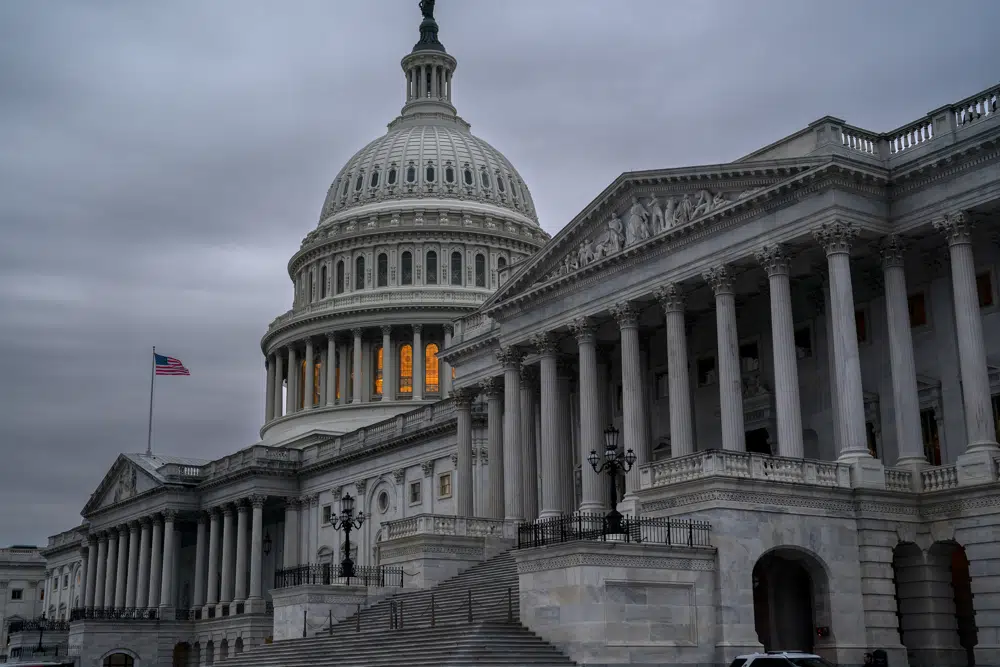
The Senate passed a massive $1.7 trillion spending bill Thursday that finances federal agencies through September and provides another significant round of military and economic aid to Ukraine one day after Ukrainian President Volodymyr Zelenskyy’s dramatic address to a joint meeting of Congress. The bill, which runs for 4,155 pages, includes about $772.5 billion for domestic programs and $858 billion for defense and would finance federal agencies through the fiscal year at the end of September. The bill passed by a vote of 68-29 and now goes to the House for a final vote before it can be sent to President Joe Biden to be signed into law. “This is one of the most significant appropriations packages we have done in a very long time,” said Senate Majority Leader Chuck Schumer, D-N.Y. “The range of people it helps is large and deep.” Lawmakers were racing to get the bill approved before a partial government shutdown would occur at midnight Friday, and many were anxious to complete the task before a deep freeze, and wintry conditions left them stranded in Washington for the holidays. Many also want to lock in government funding before a new GOP-controlled House next year could make it harder to find compromise on spending. Senators heard from Zelenskyy about the importance of U.S. aid to his country for its war with Russia on Wednesday night. The measure provides about $45 billion in military, economic, and humanitarian assistance for the devastated nation and NATO allies, more than Joe Biden even requested, raising total assistance so far to more than $100 billion. “Your money is not charity,” Zelenskyy told lawmakers and Americans watching from home. “It’s an investment in the global security and democracy that we handle in the most responsible way.” Lawmakers were in disagreement over which amendments were to be voted upon to lock in a final vote on an expedited basis. The impasses had the potential to prevent passage of the bill before the midnight Friday deadline. But negotiations overnight led to a breakthrough and senators gathered early Thursday morning to work through more than a dozen amendments before getting to a final vote. The House won’t be able to take up the bill until Friday morning, and while it is expected to pass, House Majority Leader Steny Hoyer, D-Md., said the chamber will also approve a stopgap spending resolution to ensure government services continue without interruption before the bill is signed into law. The spending bill was supported by Schumer and Senate Republican leader Mitch McConnell, though for different reasons. McConnell cited the bill’s nearly 10% boost in defense spending, which he says will give America’s Armed Forces the funding and certainty needed to ensure the country’s security. “The world’s greatest military will get the funding increase that it needs, outpacing inflation,” McConnell said. “Meanwhile, non-defense, non-veterans spending will come in below the rate of inflation, for a real-dollar cut.” McConnell faced pushback from many Republicans who don’t support the spending bill and resent being forced to vote on such a massive package with so little time before a potential shutdown and the Christmas holiday. “There has not been enough time for a single person to have read this entire bill. The bill and process ignores soaring inflation, rising interest rates and our ballooning debt of $31 trillion,” said Sen. Rand Paul, R-Ky. “Enough is enough.” Eighteen Republican senators joined with Democrats in voting for the bill. For two senators, the bill puts the finishing touches on their work in Washington. Sen. Patrick Leahy, D-Vt., is retiring after serving some 48 years in the Senate and as the current chairman of the Senate Appropriations Committee. He negotiated the bill for months with Sen. Richard Shelby of Alabama, the committee’s ranking Republican, who was elected to the Senate in 1986 and is also retiring. “What a capstone to a brilliant career,” Schumer said. The bill also contains roughly $40 billion in emergency spending in the U.S., mostly to assist communities across the country recovering from drought, hurricanes, and other natural disasters. And, of course, it includes scores of policy changes unrelated to spending that lawmakers sought to include in what is going to be the last major bill of the Congress, else they start from scratch next year in a divided Congress where Republicans will be returning to the majority in the House. One of the most notable examples was a historic revision to federal election law that aims to prevent any future presidents or presidential candidates from trying to overturn an election. The bipartisan overhaul of the Electoral Count Act is in direct response to former President Donald Trump’s efforts to convince Republican lawmakers and then-Vice President Mike Pence to object to the certification of Biden’s victory on January 6, 2021. The bill also allowed Congress to follow through on some of the most consequential bills it had passed over the past two years, such as a measure aiming to boost computer chip production in the U.S. and another to expand health care services to veterans exposed to toxic burn pits. Some $5 billion was provided help the VA implement some of the changes called for in the PACT Act, and the amount of money provided specifically for VA health care soared 22% to nearly $119 billion. “These benefits are deserved,” Leahy said. “They were earned, and they are owed.” Republished with the permission of The Associated Press.
Alabama Democrats praise Nancy Pelosi’s leadership
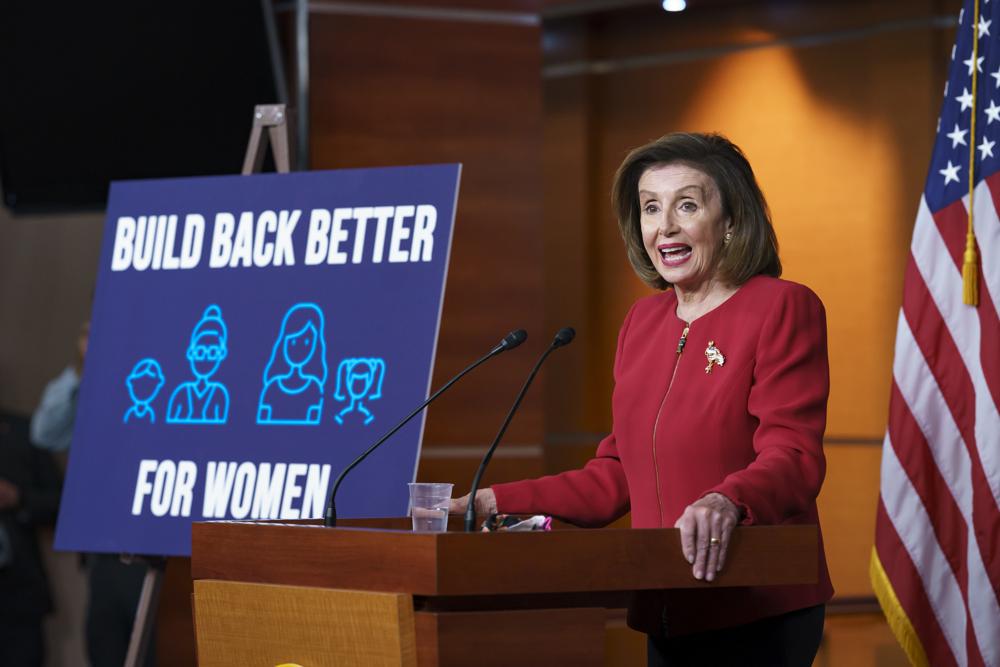
Speaker of the House Nancy Pelosi announced on Thursday that she will step down next year from her position leading the Democrats in the U.S. House of Representatives. Pelosi made the announcement the day after election results showing that Republicans will control the lower House of Congress once the new Congress convenes on January 3. Pelosi is stepping down from her top leadership role but will remain in Congress next year. “I will not seek reelection to Democratic leadership in the next Congress,” she said. “For me, the hour has come for a new generation to lead the Democratic caucus that I so deeply respect.” Alabama Democrats praised Pelosi’s leadership. Alabama Democratic Party Chairman Randy Kelley said that the move by Pelosi surprised him. “It really hit me hard,” Kelley told Alabama Today in a phone interview. “She has done a fantastic job. Whomever succeeds her will have big shoes to fill.” Congresswoman Terri Sewell praised Pelosi in a press release. “Speaker Nancy Pelosi is a true public servant whose tenure as Speaker of the House will be remembered as one of the most effective examples of leadership in modern history. For two decades, she has led the Democratic Caucus with dignity and grace, breaking down barriers for women and girls and putting the needs of the American people above all,” stated Sewell. “I have been honored to partner with Speaker Pelosi to advance the needs of Alabama’s 7th Congressional District, including our work to pass H.R. 4, the John R. Lewis Voting Rights Advancement Act,” Sewell continued. “While she will no longer lead our caucus, I have no doubt that Speaker Pelosi will remain a powerful force for good in our party and our nation. I look forward to continuing to serve alongside her.” Pelosi became Speaker of the House for the first time following the 2006 election. 2008 saw the election of Barack Obama to the presidency – giving Democrats control of both branches of Congress and the Presidency for the first time since 1994. Pelosi helped pass the Obama agenda, including the Affordable Care Act of 2010 – Obamacare. The Tea Party movement that arose to oppose Obamacare gave Republicans control of the House of Representatives in a massive “red wave” election in 2010. Despite the setback, Pelosi remained as the leader of the diminished House Democrats. In 2016 New York City billionaire Donald Trump won the Whitehouse, giving Republicans control of the government again. In 2018 Americans voted blue in large numbers giving Democrats control of the House again. Pelosi made history during the next two and a half years by impeaching Trump, not once but twice. In 2020 voters gave Democrats control of the Senate and elected Joe Biden over Trump. Pelosi helped Biden pass the CARES Act, the infrastructure bill, and the Inflation Reduction act. Despite this, or perhaps because of this legislative success, voters gave the GOP narrow control of the House of Representatives on November 8. Election results by November 16 showed that Republicans would indeed lead the House going forward and that a Republican – likely Rep. Kevin McCarthy – would be the next Speaker of the House. “She has done an exemplary job,” Kelley said. “She helped pass the infrastructure bill and the CARES Act.” The number two Democrat in the House – Rep. Steny Hoyer, is also stepping down from his leadership position, meaning there could be a wide-open contest on who will lead the Democrats moving forward. “I really have not gotten any idea who should fill that role,” Kelley said when asked who he felt should be the Democratic leader going forward. “I won’t get into trouble by naming somebody.” With Republicans now in control of the House, there is speculation that it might become more difficult for Biden to advance his agenda. “I think there is some (Republicans) who have done everything they could to stop his agenda,” Kelly said. “He has been very effective at passing his agenda, though.” Kelly said that the next two years will become essentially one long presidential campaign. “This is basically two years of campaigning for the President’s race in 2024,” Kelly said. “The Republicans will do everything they can to sabotage his presidency. The good news is that the Democrats held onto control of the Senate, and there certainly was no “red wave” as many of the prognosticators had predicted.” Pelosi’s husband, Paul Pelosi, is still recovering from a beating by an assailant with a hammer. Stepping down from leadership will allow her to spend more time with him as his recovery continues. To connect with the author of this story, or to comment, email brandonmreporter@gmail.com.
Nancy Pelosi to step aside from Dem leadership, remain in Congress

House Speaker Nancy Pelosi said Thursday that she will not seek a leadership position in the new Congress, making way for a new generation to steer the party after Democrats lost control of the House to Republicans in the midterm elections. Pelosi announced in a spirited speech on the House floor that she will step aside after leading Democrats for nearly 20 years and in the aftermath of the brutal attack on her husband, Paul, last month in their San Francisco home. The California Democrat, who rose to become the nation’s only woman to wield the speaker’s gavel, said she would remain in Congress as the representative from San Francisco, a position she has held for 35 years when the new Congress convenes in January. “I will not seek reelection to Democratic leadership in the next Congress,” she said. “For me, the hour has come for a new generation to lead the Democratic caucus that I so deeply respect.” Now, she said, “we must move boldly into the future.” Pelosi received a standing ovation after her remarks, and lawmakers and guests, one by one, went up to offer her hugs, many taking selfies of a moment in history. President Joe Biden spoke with Pelosi in the morning and congratulated her on her historic tenure as speaker of the House. “History will note she is the most consequential Speaker of the House of Representatives in our history,” Biden said in a statement, noting her ability to win unity from her caucus and her “absolute dignity.” It’s an unusual choice for a party leader to stay on after withdrawing from congressional leadership, but Pelosi has long defied convention in pursuing power in Washington. In an interview with reporters after her announcement, Pelosi said she won’t endorse anyone in the race to succeed her, and she won’t sit on any committees as a rank-and-file lawmaker. She said the attack on her husband “made me think again about staying.” But in the end, after the election, she decided to step down. “I quite frankly, personally, have been ready to leave for a while,” she said. “Because there are things I want to do. I like to dance, I like to sing. There’s a life out there, right?” During her remarks on the House floor, Pelosi recapped her career, from seeing the Capitol the first time as a young girl with her father — a former congressman and mayor — to serving as speaker alongside U.S. presidents and doing “the people’s work.” “Every day, I am in awe of the majestic miracle that is American democracy,” she said. Democrats cheered Pelosi as she arrived in the chamber at noon. On short notice, lawmakers filled the House, at least on the Democratic side, and Senate Majority Leader Chuck Schumer joined. He later joined a throng of lawmakers and hugged and kissed Pelosi on the cheek. The Speaker’s Gallery filled with Pelosi staff and guests. Some Republicans, including some newly elected members, also attended, though House Republican Leader Kevin McCarthy, who’s seeking the speakership in the new Congress, did not, telling reporters afterward that he was “busy, unfortunately.” Earlier, Pelosi noted in a statement after The Associated Press called control of the chamber that, in the next Congress, House Democrats will have “strong leverage over a scant Republican majority.” Pelosi was twice elected to the speakership and has led Democrats through consequential moments, including the passage of the Affordable Care Act with President Barack Obama and the impeachments of President Donald Trump. Her decision Thursday paves the way for House Democratic leadership elections next month when Democrats reorganize as the minority party for the new Congress. Pelosi’s leadership team, with Majority Leader Steny Hoyer of Maryland and Democratic Whip James Clyburn of South Carolina, has long moved as a triumvirate. All now in their 80s, the three House Democratic leaders have faced restless colleagues eager for them to step aside and allow a new generation to take charge. Hoyer said after Pelosi’s remarks that “it is the time for a new generation of leaders” and that he will also step down from leadership but stay in Congress. Clyburn, the highest-ranking Black American in Congress, has said he expects to stay in Congress next year and hopes to remain at the leadership table. Democratic Reps. Hakeem Jeffries of New York, Katherine Clark of Massachusetts, and Pete Aguilar of California have similarly moved as a trio, all working toward becoming the next generation of leaders. Jeffries could make history if he enters the race to become the nation’s first Black speaker of the House. After Pelosi spoke, Clyburn released a statement saying he looks forward “to doing whatever I can to assist our new generation of Democratic Leaders, which I hope to be Hakeem Jeffries, Katherine Clark, and Pete Aguilar.” One idea circulating on Capitol Hill was that Pelosi and the others could emerge as emeritus leaders as they pass the baton to new Democrats. First elected in 1987, Pelosi has been a pivotal figure in American politics, long ridiculed by Republicans as a San Francisco liberal while steadily rising as a skilled legislator and fundraising powerhouse. Her own Democratic colleagues have intermittently appreciated but also feared her powerful brand of leadership. Pelosi first became speaker in 2007, saying she had cracked the “marble ceiling” after Democrats swept to power in the 2006 midterm elections in a backlash to then-President George W. Bush and the wars in Iraq and Afghanistan. When she was poised in 2018 to return as speaker in the Trump era, she vowed: “to show the power of the gavel.” Pelosi has repeatedly withstood leadership challenges over the years and had suggested in 2018 she would serve four more years as leader. But she had not discussed those plans more recently. Typically unsentimental, Pelosi let show a rare moment of emotion on the eve of the midterm elections as she held back tears discussing the grave assault on her husband of nearly 60 years. Paul Pelosi suffered a fractured skull after an intruder broke into their home
Dick Cheney: an unlikely bridge to partisan Congress divide
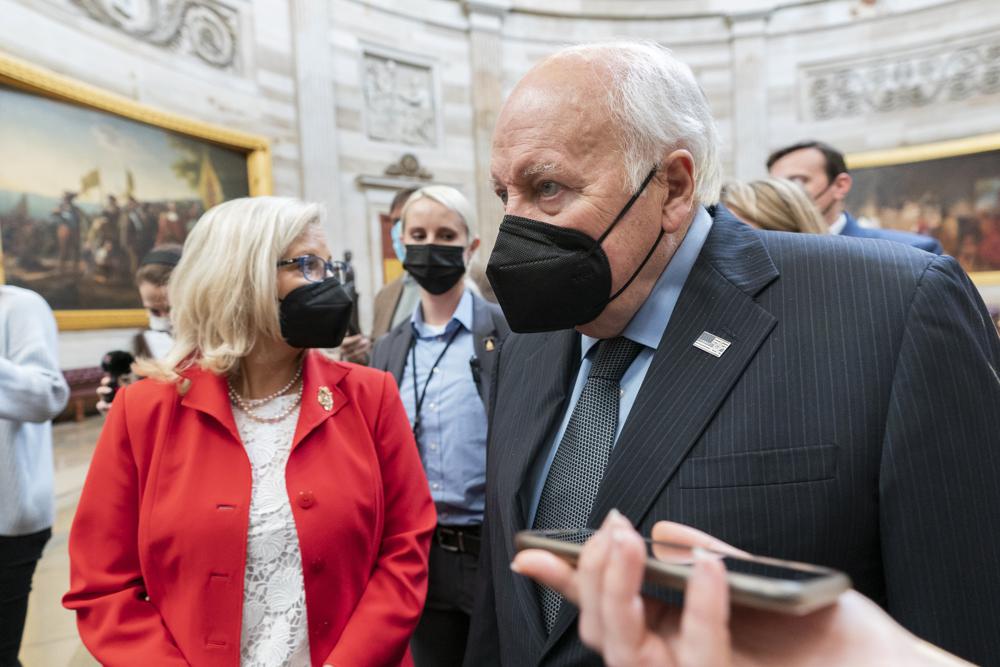
On a somber day of remembrance at the U.S. Capitol, it was the most unlikely of receiving lines: Democrats lining the floor of the House, waiting for their chance to greet Dick Cheney. Yet there he stood, the former Republican vice president that Democrats have fiercely opposed and frequently reviled, sharing warm moments after the House held a moment of silence to commemorate the deadly violence of one year ago in a building where he once served. That Cheney was the catalyst for rare bonhomie between Republicans and Democrats was a clear measure of how far his party has veered from the traditional GOP orthodoxy into the decidedly unorthodox grip of former President Donald Trump. Cheney and his daughter, Rep. Liz Cheney, R-Wyo. were the only two Republicans to attend a pro forma session of the House on the anniversary of last year’s riot at the Capitol. They sat together in the front row on the Republican side of the chamber as House Speaker Nancy Pelosi thanked the U.S. Capitol Police for defending them on January 6 and allowing Congress to “defeat the insurrection.” Republican leaders were absent. The former vice president, who served in leadership in the House as a congressman from Wyoming in the 1980s, took note. “Well, it’s not a leadership that resembles any of the folks I knew when I was here for ten years,” Cheney told reporters afterward. Cheney’s daughter, Liz, has been ostracized by her fellow House Republicans for her criticism of Trump and her support for his impeachment after the insurrection. In May, the House GOP dumped her from the No. 3 leadership post for her persistent repudiation of Trump’s election falsehoods. Asked if he was disappointed by it, Dick Cheney replied: “My daughter can take care of herself.” Democrats this summer invited Liz Cheney to join the congressional committee investigating the January 6 insurrection, further angering Republican colleagues, and she quickly became a driving force as the panel’s vice-chair. She’s found common cause with Democrats like Rep. Adam Schiff, a Democrat on the panel who led Trump’s first impeachment. He was among those greeting the Cheneys on the floor. “I was talking to Liz, and she said, ‘this is my father.’ I didn’t recognize him with a mask on.” “We were discussing what a sad moment this is in the country, what a trying time it is, and the fact that things are more at risk in terms of our democracy now than a year ago. I told him how courageous his daughter had been and how much respect we have for her.” Other Democratic lawmakers also lined up to shake the former vice president’s hand. Majority Leader Steny Hoyer, D-Md., spoke with the Cheneys at length. “I told him, thank you for being here, how proud I am of his daughter, and I know he is as well, for having the courage to stand up for truth,” Hoyer said. “We were appreciative of the fact he’s here supporting his daughter in what is otherwise a very significant minority position in the Republican Party, which is very sad,” Hoyer said. Pelosi also spoke with Cheney briefly in the House chamber. The two have waged scores of political battles over the years. She became the first female House speaker during President George W. Bush’s second term, and she sat on the dais next to the vice president as Bush proclaimed in 2007 that it was his pleasure to become the first president to begin a State of the Union address with the words “Madam Speaker.” “I was happy to welcome him back and to congratulate him on the courage of Liz Cheney,” Pelosi said. Dick Cheney also issued a formal statement after the House session, saying the importance of January 6 as a historic event cannot be overstated. “I was honored and proud to join my daughter on the House floor to recognize this anniversary, to commend the heroic actions of law enforcement that day, and to reaffirm our dedication to the Constitution,” Cheney said. “I am deeply disappointed at the failure of many members of my party to recognize the grave nature of the January 6 attacks and the ongoing threat to our nation.” Schiff said the appearance of the former vice president was a reminder of a different political era. “That was a time when there were broad policy differences, but there were no differences when it came to both parties’ devotion to the idea of democracy. And that seems like such a quaint time now.” “I look forward to the day when we get back to a Republican Party that’s once again a party of ideas and ideologies.” Republished with the permission of the Associated Press.
House sends debt limit hike to Joe Biden, staving off default
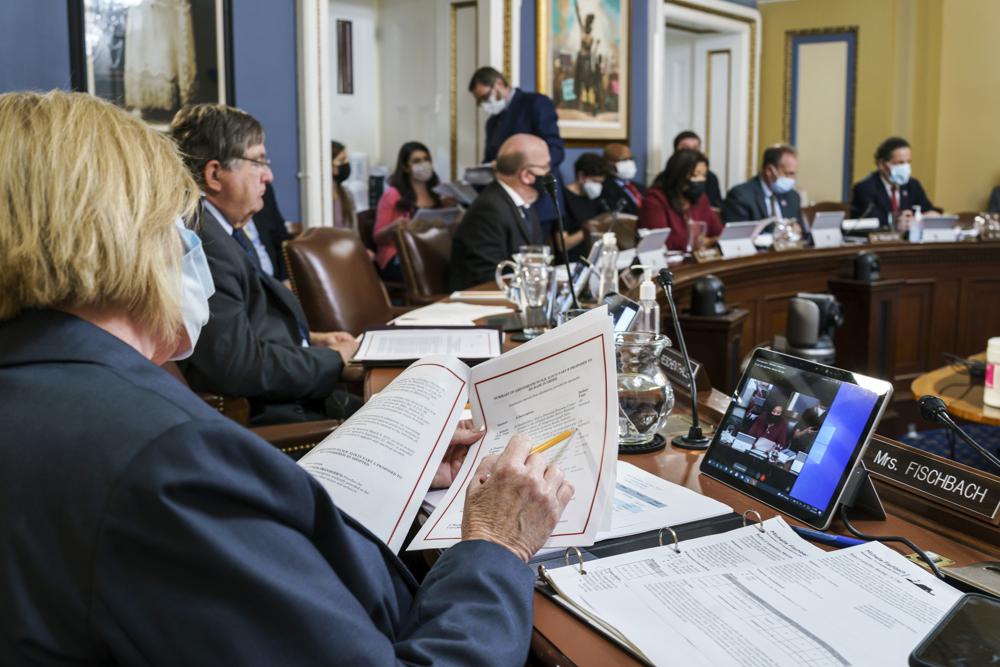
The House has approved a short-term increase to the nation’s debt limit, ensuring the federal government can continue fully paying its bills into December and temporarily averting an unprecedented default that would have decimated the economy. The $480 billion increase in the country’s borrowing ceiling cleared the Senate last week on a party-line vote. The House approved it Tuesday so President Joe Biden can sign it into law this week. Treasury Secretary Janet Yellen had warned that steps to stave off a default on the country’s debts would be exhausted by Monday, and from that point, the department would soon be unable to fully meet the government’s financial obligations. A default would have immense fallout on global financial markets built upon the bedrock safety of U.S. government debt. Routine government payments to Social Security beneficiaries, disabled veterans, and active-duty military personnel would also be called into question. The relief provided by passage of the legislation will only be temporary, though, forcing Congress to revisit the issue in December — a time when lawmakers will also be laboring to complete federal spending bills and avoid a damaging government shutdown. The yearend backlog raises risks for both parties and threatens a tumultuous close to Biden’s first year in office. “I’m glad that this at least allows us to prevent a totally self-made and utterly preventable economic catastrophe as we work on a longer-term plan,” said Rep. Jim McGovern, D-Mass. Republicans signaled the next debt limit debate won’t be any easier and warned Democrats not to expect their help. “Unless and until Democrats give up on their dream of a big-government, socialist America, Republicans cannot and will not support raising the debt limit and help them pave the superhighway to a great entitlement society,” said Rep. Tom Cole, R-Okla. Procedurally, the House took a single vote Tuesday that had the effect of passing the Senate bill. The measure passed by a party-line vote of 219-206. The present standoff over the debt ceiling eased when Senate Republican leader Mitch McConnell, R-Ky., agreed to help pass the short-term increase. But he insists he won’t do so again. In a letter sent Friday to Biden, McConnell said Democrats will have to handle the next debt-limit increase on their own using the same process they have tried to use to pass Biden’s massive social spending and environment plan. Reconciliation allows legislation to pass the Senate with 51 votes rather than the 60 that’s typically required. In the 50-50 split Senate, Vice President Kamala Harris gives Democrats the majority with her tiebreaking vote. Lawmakers from both parties have used the debt ceiling votes as leverage for other priorities. House Speaker Nancy Pelosi threatened to vote against raising the debt ceiling when President Donald Trump was in office, saying she had no intention of supporting lifting the debt ceiling to enable Republicans to give another tax break to the rich. And Republicans in 2011 managed to coerce President Barack Obama into accepting about $2 trillion in deficit cuts as a condition for increasing the debt limit — though lawmakers later rolled back some of those cuts. Pelosi told reporters Tuesday that over the years, Republicans and Democrats have voted against lifting the debt ceiling, “but never to the extent of jeopardizing it.” Pelosi offered her hope that Congress would lift the debt ceiling in a bipartisan way this December because of the stakes involved. But she also floated a bill sponsored by Rep. Brendan Boyle, D-Pa., that would transfer the duty of raising the debt limit away from Congress and vest it with the Treasury secretary, saying, “I think it has merit.” In his focus on the debt limit, McConnell has tried to link Biden’s big federal government spending boost with the nation’s rising debt load, even though they are separate and the debt ceiling will have to be increased or suspended regardless of whether Biden’s $3.5 trillion plan makes it into law. “Your lieutenants on Capitol Hill now have the time they claimed they lacked to address the debt ceiling through standalone reconciliation and all the tools to do it,” McConnell said in a letter to the president. “They cannot invent another crisis and ask for my help.” McConnell was one of 11 Republicans who sided with Democrats to advance the debt ceiling reprieve to a final vote. Subsequently, McConnell and his GOP colleagues voted against final passage. The debate over the debt ceiling has at times gotten personal. McConnell last week suggested that Democrats were playing “Russian roulette” with the economy because they had not dealt with the debt ceiling through the process he had insisted upon. He called out Pelosi for traveling to Europe last week. “I can only presume she hopes the full faith and credit of the United States will get sorted out,” McConnell said. Pelosi did not let the shot pass. “Russian roulette from Moscow Mitch. Interesting,” she said. House Majority Leader Steny Hoyer, D-Md., said Tuesday’s vote marked the 50th time dating back to President Ronald Reagan that he has voted on extending the debt limit. “Nobody has clean hands when it comes to the debt limit,” he said. Because the Senate bill only allowed for a stopgap extension, Hoyer called it a “lousy deal.” “And then we’re going to play this game one more time, a despicable and irresponsible act for adults who know better,” Hoyer said. Rep. Chip Roy, R-Texas, said he wanted to “thank” Hoyer for sharing that he had previously voted for raising the debt ceiling 49 times. “When he came into this body, the debt was about a trillion dollars,” Roy said. “Thank you, I guess, on behalf of the people of America who are staring at 28-and-a-half trillion dollars of debt.” The current debt ceiling is $28.4 trillion. Both parties have contributed to that load with decisions that have left the government rarely operating in the black. The calamitous ramifications of default are why lawmakers have been able to reach a compromise to lift or suspend the debt cap some 18 times since 2002, often after frequent rounds of brinkmanship. Republished with the permission of the Associated Press.
Gary Palmer will vote against H.R. 1 election bill
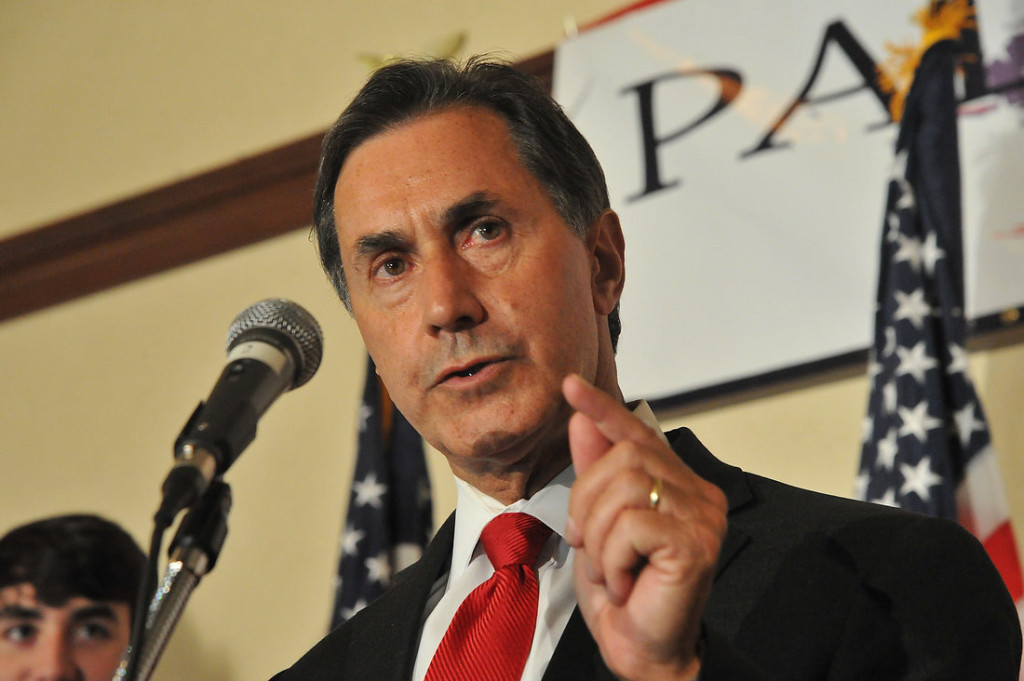
Congressman Gary Palmer announced he will vote against H.R. 1, For the People Act of 2021. According to the Congress.gov summary, the bill addresses “voter access, election integrity and security, campaign finance, and ethics for the three branches of government.” The bill aims to expand voter registration, voting access, and limits removing voters from voter rolls. It also addresses election security, campaign finance and requires the President, the Vice President, and candidates for those offices to disclose 10 years of tax returns. Palmer stated in a press release that the bill undermines Americans’ right to self-government and public confidence in the country’s election system. He stated, “This bill puts the hypocrisy of the Democrat majority on full display in two ways. First, there is nothing in the bill to deal with the inaccurate voter registration rolls that have been reported to hold 24 million improper voter registrations. The 1993 National Voter Registration Act, which was passed by Democrat majorities in both houses of Congress, requires that every state and county maintain accurate voter registration files. There are currently 17 Democrat members of Congress who voted for that bill, including Speaker Nancy Pelosi and Majority Leader Steny Hoyer. They have done nothing to enforce the law they passed.” Palmer continued, “In addition to allowing millions of improper voter registrations, the Democrats are also putting in place a provision to give millions of dollars to the reelection campaigns of incumbent members of Congress at a match rate of $6 for every dollar raised, for a match of up to $7.2 million per incumbent member. Consider this – just a few weeks ago, the Democrats stripped my colleague, Representative Marjorie Taylor Greene, of her committee assignments. But now, they seem to believe that though she isn’t allowed to serve on any standing committees, she should receive taxpayer-financed campaign contributions. Based on the formula in the bill and what Representative Greene has raised already, she would receive over $7 million. In an act of rank hypocrisy, every Democrat who voted to strip Representative Greene of her committee assignments turned around and co-sponsored this bill to give her reelection campaign over $7 million dollars.” “No one who truly wants honest and fair elections can vote for H.R. 1,” Palmer concluded. “It takes the power of electing our leaders away from the people and puts more power into the hands of politicians. It disregards state voter I.D. laws and ultimately amounts to a federal takeover of our elections. Perhaps most concerning is that it would force taxpayers to foot the bill for political campaigns, creating a ruling class that undermines representative government. It will be government of, by, and for the politicians who run the government, but not for the people the government is supposed to serve.” Palmer posted on Twitter, “No one who truly wants honest and fair elections would vote for #HR1. It takes the power of electing our leaders away from the people and puts more power into the hands of politicians.” No one who truly wants honest and fair elections would vote for #HR1. It takes the power of electing our leaders away from the people and puts more power into the hands of politicians. My full statement here: https://t.co/CXyw4wTCYZ — Gary Palmer (@USRepGaryPalmer) March 3, 2021 Congressman Mo Brooks also opposes the bill. He stated on Twitter, “Voting against #HR1 because it undermines America’s Republic and effectively turns our election results into what we so often see in North Korea, the old Soviet Union, Venezuela and other pretend republics. Sure, you can vote. But your votes don’t count.” Voting against #HR1 because it undermines America’s Republic & effectively turns our election results into what we so often see in North Korea, the old Soviet Union, Venezuela & other pretend republics. Sure, you can vote. But your votes don’t count. https://t.co/vfOSjx5Nuy — Mo Brooks (@RepMoBrooks) March 2, 2021
Dem-led House, drawing a line, kicks Marjorie Taylor Greene off committees

A fiercely divided House tossed Rep. Marjorie Taylor Greene off both her committees Thursday, an unprecedented punishment that Democrats said she’d earned by spreading hateful and violent conspiracy theories. Underscoring the political vise her inflammatory commentary has clamped her party into, nearly all Republicans voted against the Democratic move but none defended her lengthy history of outrageous social media posts. Yet in a riveting moment, the freshman Republican from a deep-red corner of Georgia took to the House floor on her own behalf. She offered a mixture of backpedaling and finger-pointing as she wore a dark mask emblazoned with the words “FREE SPEECH.” The chamber’s near party-line 230-199 vote was the latest instance of conspiracy theories becoming pitched political battlefields, an increasingly familiar occurrence during Donald Trump’s presidency. He faces Senate trial next week for his House impeachment for inciting insurrection after a mob he fueled with his false narrative of a stolen election attacked the Capitol. Thursday’s fight also underscored the uproar and political complexities that Greene — a master of provoking Democrats, promoting herself, and raising campaign money — has prompted since becoming a House candidate last year. Eleven Republicans joined 219 Democrats in backing Greene’s ejection from her committees, while 199 GOP lawmakers voted “no.” Addressing her colleagues, Greene tried to dissociate herself from her “words of the past.” Contradicting past social media posts, she said she believes the 9-11 attacks and mass school shootings were real and no longer believes QAnon conspiracy theories, which include lies about Democratic-run pedophile rings. But she didn’t explicitly apologize for supportive online remarks she’s made on other subjects, as when she mulled about House Speaker Nancy Pelosi being assassinated or the possibility of Jewish-controlled space rays causing wildfires. And she portrayed herself as the victim of unscrupulous “big media companies.” News organizations “can take teeny, tiny pieces of words that I’ve said, that you have said, any of us, and can portray us as someone that we’re not,” she said. She added that “we’re in a real big problem” if the House punished her but tolerated “members that condone riots that have hurt American people” — a clear reference to last summer’s social justice protests that in some instances became violent. Greene was on the Education and Labor committee and the Budget committee. Democrats were especially aghast about her assignment to the education panel, considering the past doubt she cast on school shootings in Florida and Connecticut. The political imperative for Democrats was clear: Greene’s support for violence and fictions were dangerous and merited punishment. Democrats and researchers said there was no apparent precedent for the full House removing a lawmaker from a committee, a step usually taken by their party leaders. The calculation was more complicated for Republicans. Though Trump left the White House two weeks ago, his devoted followers are numerous among the party’s voters, and he and Greene are allies. Minority Leader Kevin McCarthy, R-Calif., hopes GOP victories in the 2022 elections will make him speaker. Republicans could undermine that scenario by alienating Trump’s and Greene’s passionate supporters, and McCarthy took no action to punish her. “If any of our members threatened the safety of other members, we’d be the first ones to take them off a committee,” Pelosi angrily told reporters. She said she was “profoundly concerned” about GOP leaders’ acceptance of an “extreme conspiracy theorist.” At one point, No. 2 Democratic leader Steny Hoyer of Maryland strode to the GOP side of the chamber carrying a poster of a Greene Facebook post from last year. “Squad’s Worst Nightmare,” Greene had written in the post, which showed her holding an AR-15 firearm next to pictures of three of the four Democratic lawmakers, all young women of color, who’ve been nicknamed “The Squad.” “They are people. They are our colleagues,” Hoyer said. He mimicked Greene’s pose holding the weapon and said, “I have never, ever seen that before.” Republicans tread carefully but found rallying points. McCarthy said Greene’s past opinions “do not represent the views of my party.” But without naming the offenders, he said Pelosi hadn’t stripped committee memberships from Democrats who became embroiled in controversy. Among those he implicated was Rep. Ilhan Omar, D-Minn., who made anti-Israel insults for which she later apologized. “If that’s the new standard,” he said of Democrats’ move against Greene, “we have a long list.” Rep. Tom Cole, R-Okla., said Democrats were setting a precedent by punishing lawmakers for statements made before they were even candidates for Congress. Rep. Jim Jordan, R-Ohio, warned, “You engage in wrong-speak, you’re in the Thunder Dome,” a term for an enclosed wrestling arena. Committee assignments are crucial for lawmakers for shaping legislation affecting their districts, creating a national reputation, and raising campaign contributions. Even social media stars like Greene could find it harder to define themselves without the spotlights that committees provide. Not all Republicans were in forgiving moods, especially in the Senate. There, fringe GOP candidates have lost winnable races in recent years and leaders worry a continued linkage with Trump and conspiracists will inflict more damage. That chamber’s minority leader, Mitch McConnell, R-Ky., this week called Greene’s words a “cancer” on the GOP and country. On Thursday, No. 2 Senate GOP leader John Thune of South Dakota amplified that thinking. Thune said House Republicans needed to issue a “really strong” rebuke of Greene’s conspiratorial formulations. Republicans must “get away from members dabbling in conspiracy theories,” Thune said. “I don’t think that’s a productive course of action or one that’s going to lead to much prosperity politically in the future.” The fight came a day after Republicans resolved another battle and voted to keep Rep. Liz Cheney, R-Wyo., in their leadership. Pro-Trump conservatives tried removing her because she supported Trump’s impeachment. The House resolution punishing Greene was barely over a page. It said House rules require lawmakers’ behavior to “reflect credibly” on the chamber and said Greene should be removed “in light of conduct she has exhibited.” News organizations have unearthed
House Democrats mount effort to punish Georgia Rep. Marjorie Taylor Greene

House Democrats are mounting an effort to formally rebuke Rep. Marjorie Taylor Greene, a newly elected Georgia Republican with a history of making racist remarks, embracing conspiracy theories, and endorsing violence directed at Democrats. Democrats have teed up action Wednesday to send a resolution to the House floor that would strip Greene of assignments on the House education and budget committees, if House Minority Leader Kevin McCarthy, R-Calif., doesn’t do so first. “It is my hope and expectation that Republicans will do the right thing and hold Rep. Greene accountable, and we will not need to consider this resolution,” said House Majority Leader Steny Hoyer, D-Md. “But we are prepared to do so if necessary.” Some Democrats have called for going further and expelling Greene from the House — an unlikely outcome that would require backing from Republicans since expulsion requires a two-thirds vote. Another option is censure. Democrats’ willingness to act against a member of the opposing party underscores their desire to confront far-right politicians, like Greene, who are closely aligned with some of former President Donald Trump’s fringe supporters, including extremist groups that were involved in the violent Capitol insurrection. It also shines a light on the GOP’s reluctance to punish Trump supporters in their ranks for fear of alienating some of the former president’s most ardent voters. “If Republicans won’t police their own, the House must step in,” said Rep. Debbie Wasserman Schultz, D-Fla., who is sponsoring the measure to remove Greene from the committees. In a tweet over the weekend, Greene sounded a defiant tone. She also said she had spoken to Trump and was “grateful for his support.” “I will never back down and will stand up against the never-ending bloodthirsty mob,” she tweeted. On Monday, she tweeted that Democrats, if they move forward, will come to regret the “precedent they are setting,” arguing that it would be “used extensively against members on their side once we regain the majority after the 2022 elections.” Greene’s views were in the spotlight even before she joined the House last month. The Georgia Republican has expressed support for QAnon conspiracy theories, which focus on the debunked belief that top Democrats are involved in child sex trafficking, Satan worship, and cannibalism. Facebook videos surfaced last year showing she’d expressed racist, anti-Semitic, and anti-Muslim views. Top Republicans denounced her at the time, hoping to block her from capturing the GOP nomination in her reliably red congressional district in northwest Georgia. But after she won her primary, they largely accepted her. Since then, even more of her past comments, postings, and videos have been unearthed, though many were deleted recently after drawing attention. She “liked” Facebook posts that advocated violence against Democrats and the FBI. One suggested shooting House Speaker Nancy Pelosi in the head. In response to a post raising the prospect of hanging former President Barack Obama, Greene responded that the “stage is being set.” In an undated video posted online, Greene floated a conspiracy theory that falsely suggests that the 2017 mass shooting that killed 58 people at a country music festival in Las Vegas could have been a false flag operation to build support for gun control legislation. “How do you get avid gun owners and people that support the Second Amendment to give up their guns and go along with anti-gun legislation?” Greene said in the video. “You make them scared, you make them victims and you change their mindset, and then possibly you can pass anti-gun legislation. Is that what happened in Las Vegas?” She also “liked” a Facebook post that challenged the veracity of a 2012 mass shooting at Sandy Hook Elementary School in Newtown, Connecticut. Another video captured her confronting Parkland school shooting survivor David Hogg. After her election, she seized on Trump’s false claims that the election was stolen and cheered on his supporters the day before the Capitol was stormed. “It’s our 1776 moment!” she posted on the conservative friendly social media platform Parler. Last week, Pelosi pressed for House Republicans to take action against Greene. “Assigning her to the education committee, when she has mocked the killing of little children” in Newtown, “what could they be thinking, or is thinking too generous a word for what they might be doing?” Pelosi said of Republican leaders. “It’s absolutely appalling.” McCarthy is supposed to meet privately with Greene this week. A spokesperson for the Republican leader declined to comment on Monday. Although it’s not certain he will take action against Greene, McCarthy has punished members of the House Republican caucus before. Former Rep. Steve King, R-Iowa, was stripped of all his committee assignments after expressing support for white supremacists in 2019. Wasserman Schultz acknowledged Monday that it had long been left up to leaders to remove members of Congress of their own party of their committee assignments. But she said Republicans’ reluctance to take action left Democrats with little choice. “Rep. Greene’s appalling behavior both before her election and during her term has helped fuel domestic terrorism, endangered lives of her colleagues, and brought shame on the entire House of Representatives,” Wasserman Schultz said. “Based on her actions and statements and her belligerent refusal to disavow them, she should not be permitted to participate in the important work of these two influential committees.” Republished with the permission of the Associated Press.
House to stay in session until COVID-19 rescue pact

Pelosi told her Democratic colleagues on a morning conference call that “we have to stay here until we have a bill.”
Donald Trump faces pressure over Russia bounties to kill US troops

Trump won’t say publicly that he is working to get to the bottom of the issue.
Senate approves $483B virus aid deal, sends it to House
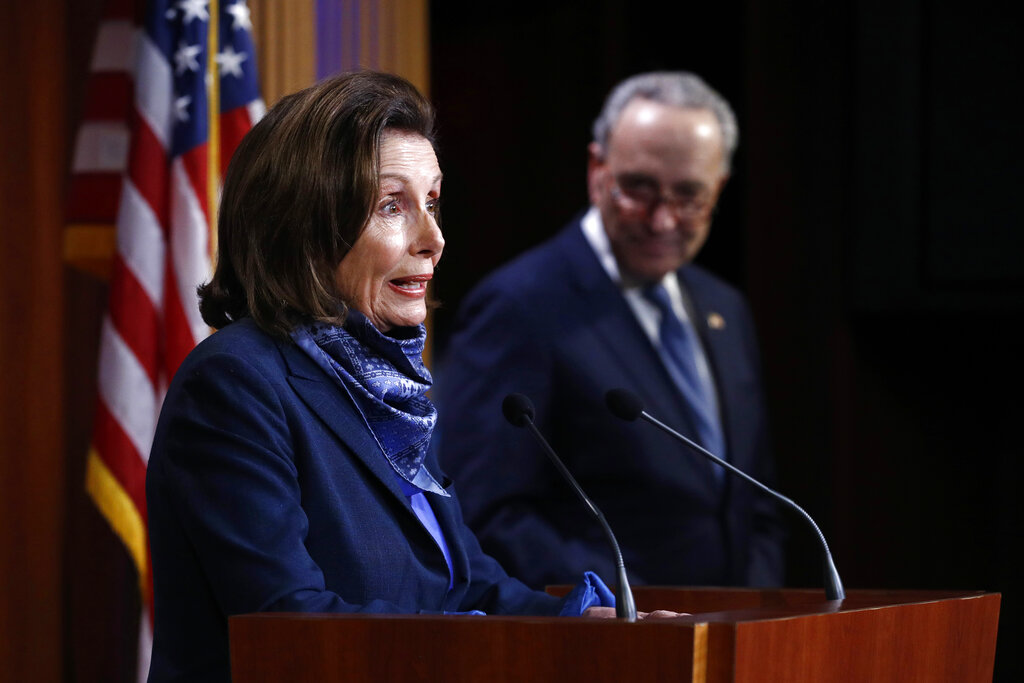
Passage was swift and unanimous, despite opposition from conservative Republicans.


